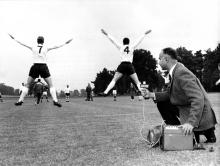Tuning In
Diasporic Contact Zones at the BBC World Service

You are here
- Home
- Empire, Sports and BBC
Empire, Sports and BBC

This project was the starting point for Sport Across Diasporas and involved extensive archive research at Caversham by James Wyllie aimed at exploring the origins of sport at the BBC World Service (BBCWS) and how and why it has changed over time, using notes of production schedules, minutes of meetings and data on audience research and finance as well as programme notes. This background research presents a story of responsiveness and change in a rapidly transforming world and provides insights into what is distinctive about sport on the BBCWS.
Research questions
This research was framed by the need to contextualise sports broadcasting on the BBC World Service.
- What was the place of sport in the early days of the World Service? How did empire and the Empire Service impact upon sport?
- How did sport fit into the programming schedules of the BBC and how did these schedules begin to change and develop?
- How did sports broadcasting on the service develop through changing political and social contexts?
- What was distinctive about sport on the BBCWS?
- Who were the World Service’s diasporic audiences for sport and how is this evidenced by what was broadcast?
This project revealed the diversity of rich material at the BBC Archive at Caversham and the distinctive qualities of this as a site of research. Material was not organised and classified as we might have expected and the process of unravelling sources of material, including fading scribbled notes on envelopes as well as more formalised production schedules was a source of enormous interest and excitement in itself. Sport as a set of practices was neither as formally present nor as prominent in the schedules as we had expected, neither were all sports covered by the service. This stage in our work provided insights into the moments of change in the BBCWS from its instigation as the Empire Service through times of social change and upheaval, including World War two and technological innovations and eruptions. The BBC itself moved from pole position, for example in coverage of the Olympics, having been overtaken by political power changes and new technologies.
Project contact:
Prof Kath Woodward, The Open University, k.woodward@open.ac.uk
James Wylie has worked as a screenwriter for film and TV, after graduating with a BA in Social and Political Science in 1988. In 1992, he was the winner of the Carl Foreman/BAFTA Screenwriting Award. His non-fiction book, The Warlord and the Renegade: The Story of Hermann and Albert Goering, was published 2006. He has also written and co-hosted 8 editions of Jazz Legends for Radio 3. He also works for the AHRC funded OU Black British Jazz project. He has worked for four years teaching drama at a specialist school for teenagers with autism.
David Goldblatt is a sports writer, broadcaster, and journalist; the author of The Ball is Round: A Global History of Football (Penguin, 2006), and the World Football Yearbook(Dorling Kindersley, 2002), has taught the sociology of sport at the University of Bristol, and has run literacy programmes at football clubs. He has written for most of the quality broadsheets and magazines such as the New Statesman and is currently the sports’ columnist for Prospect magazine. He has worked for BBC Radio 4 and the BBC World Service.
Kath Woodward is Professor of Sociology and Head of Department at the Open University. She is also a member of the ESRC centre CReSC and works on gendered diasporic identifications and sporting embodied practices. She has contributed to BBC Radio 4, Canadian radio and Sky TV and (as an academic) to the boxing film Twelve Rounds. Her most recent books are, Boxing, Masculinity and Identity (2007), Embodied Sporting Practices (2009) and, with Sophie Woodward, Why Feminism Matters (Palgrave, 2009).
Project members:
- Sports Across Diasporas

